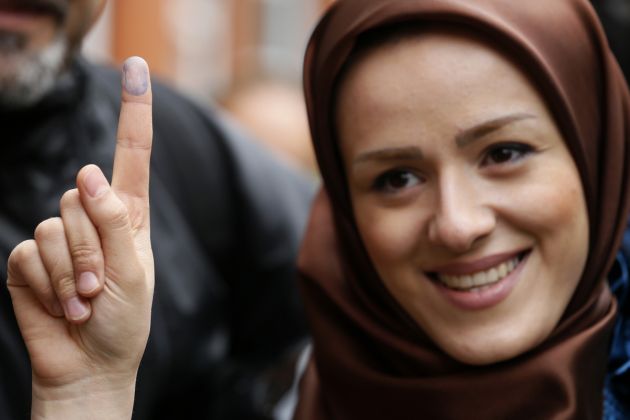Christianity in Iran manages to keep going despite crackdowns

The government of Iran increased its persecution of Christians in order to clamp down on perceived threats ahead this week's presidential election, but Christianity is still managing to thrive in the Muslim country.
Elam Ministries, according to Christianity Today (CT), reported in their Summer 2013 report that 246 Iranians were baptized on April 17, "probably the largest baptism service on record in the Iranian church since the fourth century."
In addition, CT indicated on Thursday that "Iran's underground churches - where freedom to attend Persian-language worship services is more likely to be found - do appear to be growing."
The most recent crackdown by Iranian authorities was the closing of the largest Farsi-language Pentecostal church in the country and the arrest of one of its pastors, according to media reports.
In late May, agents shut down Central Assemblies of God Church in Tehran. A week earlier they had arrested Pastor Robert Asserian during a service.
"These incidents appear to be an attempt to stop worship services from being conducted in Farsi, the language of the majority of Iranians," George Wood, general superintendent of the AoG in the U.S., told BosNewsLife, a Christian news service, which focuses on persecuted Christians.
"Services are allowed in Armenian, a minority language that most Iranians do not speak or even understand," he said.
Iranian-American journalist Lisa Daftari told Fox News that Farsi-speaking Christians are mostly converts from Islam.
About 98 percent of Iran's population that is now around 80 million, are Muslims and Christians only account for some 100,000, but she said the Iranian government sees converts from Islam as dangerous.
"This conversion from Islam to Christianity is a threat this regime wants to contain," said Daftari. "By stopping the Farsi language ability to pray in that language they almost hope to stop this drain from Islam to Christianity."
Armenians within Iran are allowed to have services in their language, said Daftari, because they are already Christians.
Daftari said the Iranian government fears Christianity because it represents a Western culture and a Western way of life.
"You also have to look at the second reason, which it that it is a theocracy," she said. "It is blindly controlling a population of 75 million in the name of Allah, in the name of Sharia law, in the name of Islam. So it's a big threat to their preaching or using the religion to control the masses."
Daftari echoed the CT report concerning the growth of Christianity within Iran.
"In light of the persecutions, we are also seeing a growing trend among Muslims to convert to Christianity," she said, noting, that converts are disillusioned by the government.
"This theocracy for the last 34 years since the revolution has created a very godless society. They have turned people off from practicing Islam. They see it as a religion which is stopping them from living in their social, religious and cultural ways. "
She pointed out that Islamic converts to Christianity within Iran practice secretly in house churches because under Sharia law their conversion is punishable by death.
Although of late authorities have been issuing longer prison sentences rather than the death penalty, she said that the latter has been carried out.
For example, said Daftari, all the teachers of a Christian school were executed by the regime.
According to BosNewsLife, a key official of one of Iran's largest house church movements warned the election to replace outgoing President Mahmoud Ahmadinejad would not improve conditions for Christians in Iran.
"The real power is with Supreme Leader Ayatollah Ali Khamenei who is the one deciding on major policies," said Firouz Khandjani, a council member of the Church of Iran movement.
"We have to remember that the president in Iran has less power than the French prime minister. Khameini even controls the Interior and Intelligence ministers, who are feared by Christians."
The first president of the Islamic Republic of Iran, Abolhassan Bani-Sadr, said that Khamenei would choose the next president and called for a boycott of the election in an op-ed in the Christian Science Monitor.
"In reality, Ayatollah Ali Khamenei will decide Iran's presidential election, " he said. "That is why actively boycotting this election would be an act to regain dignity as well as be a mass, nonviolent uprising that could end a regime that prolongs its existence by moving Iran from crisis to crisis."
Bani-Sadr now lives in exile near Paris.
Iranians are not Arabs, said Daftari, but she said that they had their version of the so-called "Arab Spring," during the last presidential election four years ago.
"The crackdowns were so brutal that a lot of Iranians are looking at this election as a joke. It's an 'election show', they're calling it."